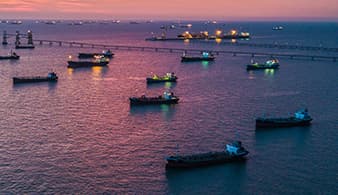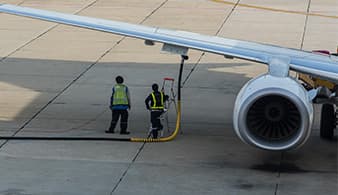Overview
Argus has been bringing price transparency to the oil industry since 1970, providing valued insight into all refined products and biofuels markets globally.
Our range of industry-leading price benchmarks, all informed by the most robust methodologies, provide a true reflection of how the markets operate and are relied upon across the value chain to facilitate global trade.
Our experts are embedded in local markets across the world and are in constant contact with market participants for the latest spot market intelligence. Their insights underpin our price assessments and market analysis, enabling our clients to make the most effective decisions for their business.
Oil products market coverage
Argus is the leading independent provider of market intelligence to the global energy and commodity markets. Our price assessments and market intelligence are available for every kind of refined oil product. Explore the coverage most relevant for your industry.
Latest oil products news
Browse the latest market moving news on the global oil products industry.
Sydney Airport passenger traffic rises 3pc in 2025
Sydney Airport passenger traffic rises 3pc in 2025
Sydney, 6 February (Argus) — Australia's busiest airport recorded higher passenger transit in 2025 on increased international activity, Sydney airport data released 4 February show. October-December transits of 11.41mn passengers were by 4pc up on the year, driven by a 6pc rise in international travellers. Last year was Sydney's busiest ever for international travel with 17.17mn passengers passing through gates. But the 25.36mn domestic passengers was still down from pre-Covid levels of 27.5mn in 2019. And total passenger numbers in 2025 were 4pc below 2019 figures. Passenger traffic at Australia's Melbourne Airport — the nation's second-busiest — rose by 7pc on the year in 2024 to 35.75mn, but this was 5pc below 2019's 37.45mn. National jet fuel sales leapt 8pc in the first 11 months of 2025 to 172,000 b/d, with November the latest month for which data from Australian Petroleum Statistics are available. The figure was just 160,000 b/d in January-November 2024. Jet fuel sales in New South Wales state, where Sydney airport is located, averaged 57,000 b/d in January-November last year, up from 55,000 b/d in the first 11 months of 2024. By Tom Major Sydney Airport passenger traffic Oct-Dec '25 Jul-Sep '25 Oct-Dec '24 2025 2024 2019 q-o-q % ± y-o-y % ± 2025 vs 2024 % ± Total 11.41 10.68 11 42.54 41.4 44.4 7 4 3 International 4.62 4.28 4.4 17.17 16.3 16.9 9 6 5 Domestic 6.79 6.4 6.7 25.36 25.1 27.5 6 2 1 Source: Sydney Airport Send comments and request more information at feedback@argusmedia.com Copyright © 2026. Argus Media group . All rights reserved.
E15 'council' convenes without Dem. lawmakers
E15 'council' convenes without Dem. lawmakers
New York, 5 February (Argus) — A council of Republican lawmakers tasked with negotiating major changes to US fuel policy held its first meeting Tuesday evening, leaving out Democrats that had pushed for a seat at the table. The US House of Representatives last month punted on a proposal that would have allowed year-round sales of gasoline with up to 15pc ethanol (E15) and restricted how many refiners can win hardship exemptions from annual biofuel mandates. Instead, lawmakers tasked a new "rural domestic energy council" with developing policy recommendations by 15 February in the hopes that Congress will weigh legislation by 25 February. The full council met for the first time Tuesday evening, four people familiar with the matter said. The task force includes more than 20 House Republicans with a range of views on biofuel policy, but no Democrats, two of the people said. The office of House speaker Mike Johnson (R-Louisiana), who was in charge of appointing council members, did not respond to Argus' requests for comment. "My Democratic colleagues and I have been clear about the need for Democratic voices on this council — a concern leadership has so far failed to address," representative Nikki Budzinski (D-Illinois) said. "I will continue to press for real, bipartisan action that our growers deserve." Proposals to expand E15 have historically drawn bipartisan support, particularly from Midwestern lawmakers keen to help the region's farmers. Democrats could still support legislation that includes an E15 deal even if left out of negotiations this month. But some lobbyists close to the debate privately doubt that the council will reach any substantial compromise, especially after the earlier E15 proposal drew strong opposition from mid-sized oil refiners that want to maintain their ability to avoid the costly biofuel quotas. The council includes members from states with those refineries, including Gabe Evans' district (R-Colorado), where a Suncor refining complex is located, while CVR Energy and HF Sinclair have units in council co-chair Stephanie Bice's state (R-Oklahoma). Some Republican US senators that have long wanted deeper reforms to the biofuel mandate program are also skeptical of the earlier proposal, complicating any deal's chance of passage. "The federal government should not force Americans to put ethanol in their gas tanks," senator Mike Lee (R-Utah) said. "It is not good for the economy, the environment or car engines. We should not subsidize the corn industry at the expense of hardworking American families." The latest E15 proposal was developed partly by the American Petroleum Institute — an influential lobby within the Republican Party — and has won the support of larger oil refiners like Valero. Farmers' and fuel groups that support the earlier bill have urged the council to focus narrowly on improving it, rather than considering more divisive fuel market issues too. President Donald Trump, who has backed the biofuel industry with a proposal last year for record-high blend mandates, has made clear that he would sign legislation expanding E15 access. He said in an Iowa speech last month that he was optimistic Congress could strike a deal. It is unclear when the council, which includes a number of farm-state biofuel supporters too, plans to meet again. The large majority of gasoline in the US is sold as a 10pc ethanol blend. Farm advocates have pushed for over a decade to loosen summertime smog rules that forbid sales of higher blends in much of the country without emergency waivers . By Cole Martin Send comments and request more information at feedback@argusmedia.com Copyright © 2026. Argus Media group . All rights reserved.
Rotterdam biomarine 2025 sales fall as bio‑LNG surges
Rotterdam biomarine 2025 sales fall as bio‑LNG surges
London, 5 February (Argus) — Marine biodiesel sales fell on the year in Rotterdam in 2025, but bio-LNG and biomethanol made sharp gains while conventional bunker fuels were roughly steady. Marine biodiesel blend sales fell by 16pc to 629,700t in 2025 from 2024, according to data from the Port of Rotterdam. Sales declined by 18pc in the fourth quarter from the third quarter. Data from the Port of Singapore, on the other hand, showed strong growth in blend sales, with marine biodiesel sales higher by 56pc year-on-year in 2025. This was driven by higher uptake of B24, B30 and B100 used to meet FuelEU Maritime requirements, which came into effect in 2025 and require ships coming in, out of, and operating within EU waters to reduce emissions. Rotterdam sales fell due to more competitive pricing east of Suez, pulling demand towards Singapore. B24 Ucome dob Singapore prices averaged $685.71/t in 2025, compared with $797.23/t for B30 Ucome dob ARA. Shipowners bunkering marine biodiesel in Singapore for EU-bound voyages can use it for FuelEU Maritime compliance. Energy used on voyages between EU and EEA ports and non-EU ports has a 50pc share of regulatory coverage, and full coverage for voyages intra-EU. Compliance generated from bunkering marine biodiesel in Singapore can then be used to achieve compliance on vessels operating European routes, via the pooling mechanism, in which obligated companies can combine their compliance balance with other vessels. This has driven an emerging FuelEU compliance surplus market, where participants can buy compliance via pooling to avoid physical bunkering of alternative marine fuels. For use of bio-LNG, over-compliance has sold at a significant premium to cost. As a result, bio-LNG bunker sales in Rotterdam jumped by more than 500pc on the year to 17,650m³ in 2025 on strong demand , and by 1,975pc on the year in the fourth quarter. Biomethanol sales rose by 200pc on the year to 11,800t in 2025, also supported by FuelEU Maritime and an increase in the number of methanol-capable vessels coming into operation — 60 methanol-capable vessels were in operation or on order in 2025, according to DNV data, compared with 17 in 2024. Sales of conventional bunker fuels in Rotterdam in 2025 were largely stable, up by 1pc on the year to 8.73mn t. But ultra-low sulphur fuel oil (ULSFO) sales rose by 16pc on the year, to the highest since 2021, as demand rose to reflect stricter requirements after the Mediterranean was designated an emissions control area (ECA) by the International Maritime Organisation (IMO) in May. Vessels transiting the sea are limited to emitting 0.1pc sulphur. The sulphur emission limits of the ECA in the Mediterranean also contributed to firmer demand for marine gasoil (MGO) and marine diesel oil (MDO). Sales of the products at Rotterdam were up 7pc on the year while fourth quarter sales were unchanged on the year but up by 4pc on the quarter. MGO-based marine biodiesel blends firmed to record highs of 93,200t in 2025, supported by the ECA expansion. But European decarbonisation and regulations — such as EU ETS expansion, FuelEU Maritime, and RED III — made very-low sulphur fuel oil (VLSFO) less attractive for shipowners that are seeking ECA-compliant 0.1pc sulphur fuels such as ULSFO or marine gasoil. VLSFO sales fell by 7pc on the year in 2025 while fourth quarter VLSFO sales were down 8pc on the year but up 17pc quarter on quarter. The increase in scrubber-fitted vessels continued to support sales of high-sulphur fuel oil (HSFO) at Rotterdam, which increased 3pc on the year. HSFO sales at the port in the fourth quarter were up by 3pc on the year but down by 8pc on the quarter. By Hussein Al-Khalisy and Siew Hua Seah. Rotterdam bunker sales t Fuel 2025 2024 y-o-y % 4Q 2025 3Q 2025 q-o-q % 4Q 2024 y-o-y % ULSFO 864,782 748,186 16% 219,039 232,720 -6% 193,567 13% VLSFO 2,850,083 3,076,817 -7% 745,786 635,638 17% 810,831 -8% HSFO 3,420,908 3,330,327 3% 804,962 872,077 -8% 780,437 3% MGO/MDO 1,590,902 1,483,332 7% 402,781 387,173 4% 395,903 2% Conventional total 8,726,675 8,638,662 1% 2,172,568 2,127,608 2% 2,180,738 -0% Biofuels blends 629,706 752,103 -16% 161,934 198,515 -18% 118,201 37% LNG (m³) 992,911 941,366 5% 192,433 331,620 -42% 263,068 -27% Bio-LNG (m³) 17,644 2,775 536% 11,932 960 92% 575 1975% Biomethanol 11,819 3,946 200% na na na 930 na Port of Rotterdam Send comments and request more information at feedback@argusmedia.com Copyright © 2026. Argus Media group . All rights reserved.
Crude Summit: Brazil not worried about Venezuela crude
Crude Summit: Brazil not worried about Venezuela crude
Houston, 4 February (Argus) — Rising volumes of heavy sour Venezuelan crude will not compete with Brazilian grades because they cater to different markets, panelists said at the Argus Americas Crude Summit in Houston, Texas, today. In the short term, less than 300,000 b/d of Venezuela crude will head to the US while Brazil will keep sending barrels worldwide, mainly to Asia, said PetroChina International Trading's vice president of crude Alipio Ferreira. "It makes a lot of sense for American refiners to buy this," Ferreira said. The Venezuelan crude will compete with other grades including Western Canadian Select (WCS), and crudes from Mexico, Ecuador and Colombia, said state-controlled Petrobras' global crude oil manager Fernando Colares Nogueira on the sidelines of the conference. More Venezuelan heavy sour crude is hitting the global market after trading firms Trafigura and Vitol were approved by the US government to market unsanctioned Venezuelan oil following the US capture of former Venezuelan president Nicolas Maduro on 3 January. More recently, the US lifted sanctions on Venezuela's oil exports, with caveats prohibiting sales to Cuba, business deals involving many Chinese companies and oil-for-debt arrangements. The lifting of sanctions will allow Venezuela's state-owned PdV to directly sell cargoes to eligible buyers abroad. Brazil is the sixth-largest oil producer, with output increasing by about 400,000 b/d in 2025, part of a boom in crude production in Latin America that will continue, Nogueira said. Most of Brazil's exports will continue to go to Asia though the end of the decade , Ferreira said. Growing supply from Brazil and Argentina could also lead to an increase in co-loading cargoes with crude from the two countries going to China, Ferreira said. Petrobras has already co-loaded crude from the two countries on a very large crude carrier (VLCC) — one time late last year and once early in 2026, Ferreira said. The co-loading involves a ship-to-ship transfer. Argentina sent a few cargoes of light sweet Medanito crude to Asia-Pacific at the start of this year as producers try to expand the grade's market in the region. Only four Medanito cargoes headed to Asia-Pacific in 2024, according to data from oil analytics firm Vortexa. The growing number of shipments to Asia come as a consortium of eight Argentinian producers build a new oil pipeline, the 271-mile Vaca Muerta Sur, connecting the Vaca Muerta shale fields, from where Medanito is produced, to the Punta Colorada port. The new port will handle VLCCs. The lack of VLCC loading has been one of the biggest bottlenecks for expanding Medanito's reach to Asian markets. Currently, draft limitations cap Argentina exports to a maximum 800,000 bl on Suezmaxes or Aframaxes, which makes sales to Asia-Pacific mostly unfeasible. By Eunice Bridges Send comments and request more information at feedback@argusmedia.com Copyright © 2026. Argus Media group . All rights reserved.
Spotlight content
Browse the latest thought leadership produced by our global team of experts.
Explore our oil products services
Whether you’re looking for independent spot price assessments or long-term market analysis, we have the solutions you need for the refined oil and biofuels markets. Explore the range of our services.
Key price assessments
Argus prices are recognised by the market as trusted and reliable indicators of the real market value. Explore some of our most widely used and relevant price assessments.












